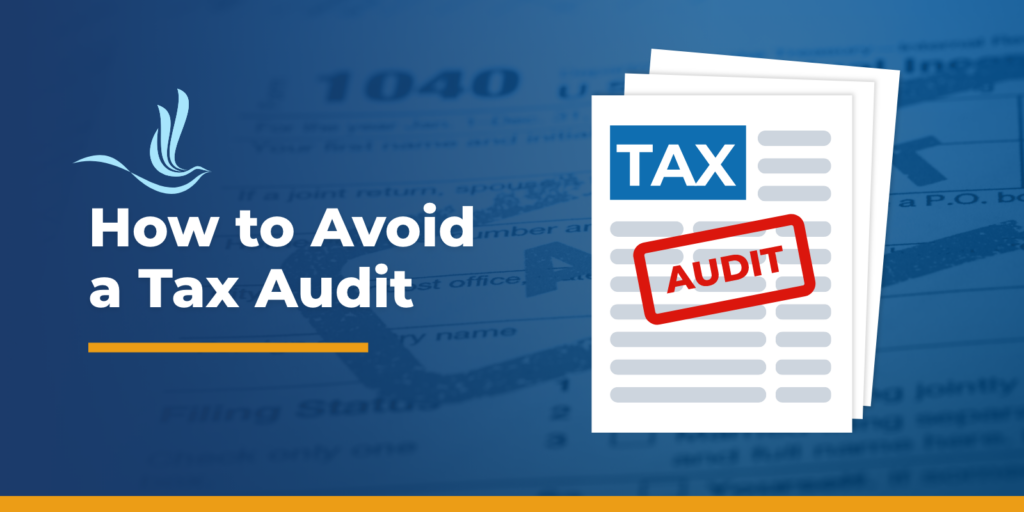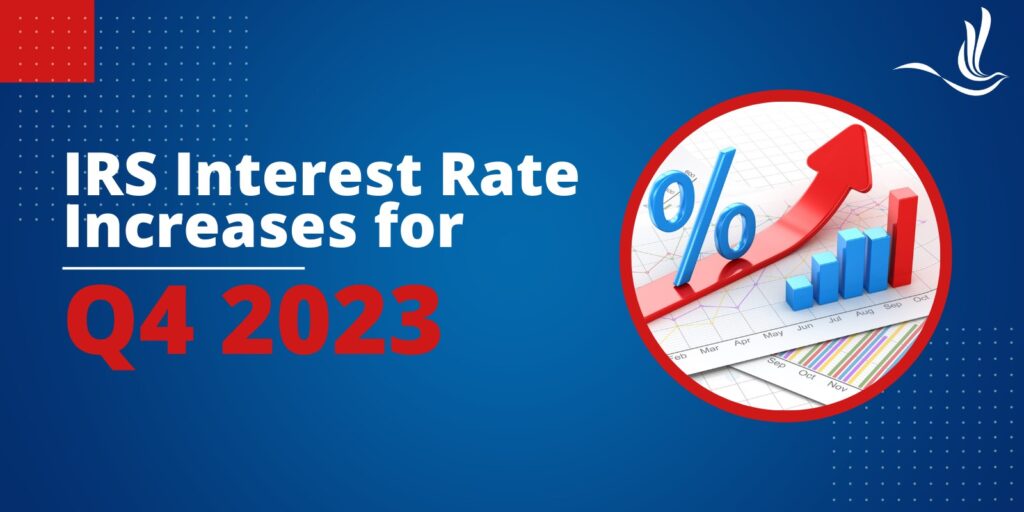How to Avoid an IRS Audit

While there is no guaranteed method of avoiding tax audits, there are things that could help trigger them. Since the Senate approved nearly $80 billion in IRS funding through the Inflation Reduction Act of 2022, with $45.6 billion specifically for enforcement, the IRS has promised an increase in tax audits. Below are some things that the IRS has historically viewed as “red flags,” which could increase the chances of an audit for taxpayers. But first, let’s review the different types of audits.
Types of IRS Audits
The IRS conducts different types of audits to review and verify taxpayers’ financial information and ensure compliance with tax laws. There are three primary types of IRS audits:
- Correspondence Audits: These are the most common and least intrusive type of IRS audit. In a correspondence audit, the IRS requests specific documentation to support claims on their tax return. Typically, these audits are focused on one or a few specific issues, such as income, deductions, or credits. Taxpayers can respond to these audits by mail, providing the requested documentation and explanations.
- Office Audits: An office audit, as the name suggests, takes place at an IRS office or a local IRS branch office. The IRS will contact the taxpayer to schedule a face-to-face appointment for the audit. The taxpayer will be required to bring the necessary records and documentation to the IRS office. Office audits are often more comprehensive than correspondence audits as they can cover a wider range of issues on a tax return.
- Field Audits: Field audits are the most extensive and thorough type of IRS audit. In a field audit, an IRS agent comes to the taxpayer’s home or business to conduct the audit in person. These audits are usually reserved for more complex or high-risk cases. That said, they can involve a comprehensive review of a taxpayer’s financial records and activities. Field audits are often conducted when there are significant discrepancies or concerns about a taxpayer’s compliance with tax laws. However, note that the IRS has halted most unannounced visits to taxpayers.
Reporting a Business Loss
The IRS will be more inclined to audit a taxpayer who reports a net business loss, even if it’s small. Reporting losses year after year will only increase IRS interest in your tax returns. Remember, it is mandatory to report all earnings in a tax year. However, it might be helpful to reconsider which expenses should be deducted from your tax return. Reporting even a small profit could reduce the chance of being audited by the IRS.
Being Vague About Expenses
When it comes to expenses, the more detail the better. This is especially true when categorizing them on your return. Try to avoid listing expenses under “Other Expenses” as this will lead to more scrutiny from the IRS. It may even be helpful to provide supplemental documentation explaining why certain expenses drastically increased or decreased for that year. Doing so can give potential auditors a valid explanation for such occurrences and possibly avoid a tax audit. Additionally, rounding dollar amounts are red flags for the IRS. You should always use exact dollar amounts on your tax return.
Filing Late
Some taxpayers believe that filing late can actually decrease the risk of being audited. However, filing on time, as well as paying on time, can help establish a history of IRS compliance. This will be far more beneficial in the long run. In addition, not filing by the due date will also result in receiving your tax refund later if you are expecting one. Even worse, if your late filing triggers an audit, it may prompt the IRS to look at older tax returns you’ve filed. If they find any other errors, this can add additional time to their normal processing schedule.
Claiming Excessive Deductions
It is best to avoid any excessive expenses. For example, deducting the cost of your breakfast and lunch each workday may not be acceptable to the IRS. Excessive deductions for your donations to charitable organizations can also increase the chances of being audited. Inflating business expenses can result in being audited, especially if you try to claim large amounts for business entertainment or claim a vehicle that is used for only business purposes 100 percent of the time.
Now that home offices are more common, it’s important to only claim the home office deduction for the portion of your home that is used exclusively for business purposes. When claiming this deduction, you will need to figure out how much square footage in your home is dedicated to your business. For tax year 2023, the rate for the simplified square footage calculation is $5 per square foot, with a maximum of 300 square feet or $1,500. Excessive deductions claimed on your return are fast tracks to being audited by the IRS. That said, it’s best to only claim the deductions you actually qualify for to avoid owing any additional taxes.
Keeping Poor Records
Even the simplest tax situations require adequate records. If your finances are more complicated, then detailed records are necessary. Some taxpayers may feel inclined to estimate their expenses because they did not save receipts or documents, which the IRS views as a red flag. It’s important to make sure you have detailed records for the past three tax years at minimum. Having items like your previous tax returns, medical bills, business receipts, real estate documents, and investment statements can help substantiate your claims and avoid an IRS audit.
Choosing the Wrong Filing Status
Your filing status (single, married filing jointly, married filing separately or head of household) determines how you treat many tax decisions, such as what forms you’ll fill out, which deductions and credits you’ll take and how much you will pay (or save) in taxes. Select the wrong status, and it will trigger a cascade of mistakes–maybe even an audit. On top of that, if you decide to file jointly with your spouse, this means you’re responsible for any errors or deliberate falsehoods on your partner’s return, so make sure that you’re comfortable with what it says.
Tax Relief for Those Being Audited
The chances of being audited are low, but those chances increase when the IRS notices any of the above red flags. The audit process can be very stressful. It is a tedious process that requires collecting information regarding your income, expenses, and itemized deductions. Failing an audit can result in a huge, unexpected tax bill. It’s best to seek assistance from experts who can help you avoid an IRS audit. Remember, filing your taxes correctly the first time can help avoid interest, tax penalties, and additional taxes owed. Optima Tax Relief is the nation’s leading tax resolution firm with over $1 billion in resolved tax liabilities.
If You Need Tax Help, Contact Us Today for a Free Consultation
How Wash Sales Affect Your Taxes

Taxes are an inevitable part of financial life, and for investors, understanding how different transactions can impact their tax liability is crucial. One such transaction is a wash sale. Wash sales can have a significant effect on taxes. Investors should be well-versed in the rules and implications of these transactions to avoid costly mistakes. In this article, we’ll explore what wash sales are and how they affect taxes.
What is a Wash Sale?
A wash sale occurs when an investor sells a security, such as stocks or bonds, at a loss and then repurchases the same or a substantially identical security within a specific time frame, typically 30 days. The IRS prohibits the recognition of capital losses from wash sales. In simpler terms, if you sell a stock at a loss and buy it back within the wash sale window, you can’t use that loss to offset capital gains or reduce your taxable income.
Wash Sale Example
Let’s say you purchase 50 shares of ABC stock for $10,000. The value then decreases to $8,000. You decide to sell your shares of ABC stock on March 1, which results in a $2,000 loss. A week later you purchase 50 stocks of ABC stock again for $8,200 in a wash sale. In this scenario, you would not be able to claim the capital loss as a tax deduction since you repurchased the same stocks within 30 days. Instead, your loss of $2,000 is added to your cost basis of $8,200, making your new cost basis $10,200.
In the future, if you were to sell your stocks for a higher price, your capital gains would be calculated based on your new cost basis of $10,200. For example, let’s say that in three years, you sell your stocks for $15,000. Your total taxable gain would only be $4,800 ($15,000 – $10,200) and not $7,000 (15,000 – $8,000).
The Impact on Taxes
Wash sales have several notable effects on taxes:
- Loss Disallowance: The most significant impact of a wash sale is that the capital loss resulting from the sale is not allowed for tax purposes. This means that the investor cannot use the loss to offset capital gains in the same tax year. This reduces the potential for a lower tax bill. Instead, the disallowed loss is added to the cost basis of the repurchased security.
- Deferred Tax Benefit: While wash sales disallow immediate tax benefits, they can provide deferred tax benefits. The disallowed loss becomes part of the adjusted cost basis of the repurchased security. This can potentially reduce the capital gains or increase the capital loss when the repurchased security is eventually sold in a transaction that is not a wash sale.
- Complex Tracking: Investors must keep meticulous records of their trades, including those that result in wash sales. This requires detailed tracking of the purchase and sale dates, security identifiers, and amounts involved to accurately calculate the adjusted cost basis.
IRS Penalties on Wash Sales
While wash sales are not illegal, the IRS does not allow you to write off losses that result from them. The IRS can impose penalties for claiming a wash sale write-off if you fail to follow related regulations. In some cases, the IRS may impose interest and penalties on the additional taxes owed due to the disallowed loss. The specific penalties and interest charges can vary based on individual circumstances. However, they can add to the overall cost of the wash sale mistake.
How to Report Wash Sales on Tax Returns
Reporting wash sales on your tax return is essential for complying with IRS regulations and avoiding penalties. To report wash sales, you’ll need to use IRS Form 8949 and Schedule D when filing your tax return. You will use Form 8949, Sales and Other Dispositions of Capital Assets, to report your capital transactions, including wash sales.
After completing Form 8949, transfer the information from this form to Schedule D, Capital Gains and Losses. Schedule D is where you calculate your net capital gain or loss for the tax year. Typically, you will receive 1099 forms when investing. You should compare the information reported on Form 8949 to the amounts that were reported on your 1099 forms to check for accuracy.
Avoiding Wash Sale Pitfalls
To avoid the negative tax impact of wash sales, investors can consider the following strategies:
- Wait 31 Days: To be absolutely sure that a sale does not result in a wash sale, investors can wait at least 31 days before repurchasing the same security. This ensures that the IRS’s 30-day wash sale rule is not violated.
- Trade Alternatives: Investors can consider trading similar but not substantially identical securities to capture market opportunities while avoiding wash sales. For example, selling shares in one company and purchasing shares in a similar company may provide similar exposure to the market without triggering a wash sale.
Tax Help for Investors
Wash sales can have a significant impact on an investor’s tax liability, but with proper planning and record-keeping, their effects can be mitigated. Understanding the rules surrounding wash sales is essential for investors to make informed decisions, minimize tax liabilities, and avoid IRS penalties. Whether you’re a seasoned investor or just starting, consulting with a tax professional or financial advisor can be invaluable in navigating the complexities of wash sales and their impact on taxes. Optima Tax Relief is the nation’s leading tax resolution firm with over $1 billion in resolved tax liabilities.
If You Need Tax Help, Contact Us Today for a Free Consultation
IRS Interest Rate Increases for Q4 2023

As the fourth quarter of 2023 unfolds, taxpayers across the U.S are faced with an important development – an increase in IRS interest rates. The IRS periodically adjusts its interest rates, and these changes can have significant implications for individuals and businesses. In this article, we will explore the reasons behind the IRS interest rate increases, how they impact taxpayers, and what individuals and businesses can do to navigate this change effectively.
About IRS Interest Rates
The IRS sets interest rates to determine the amount of interest that accrues on unpaid taxes, late payments, and overpayments. Interest rates can vary by quarter. They are based on the federal short-term rate plus an additional 0.5 to 5 points, depending on the type of underpayment or overpayment. It’s also crucial to note that IRS interest rates compound daily. This means that the interest charged is based on the previous day’s tax balance, plus the interest.
What are the new IRS interest rates for Q4 2023?
The interest rates imposed by the IRS as of October 1, 2023, are as follows:
- Individual Tax Underpayment: 8%
- Large Corporation Tax Underpayment: 10%
- Individual Tax Overpayment: 8%
- Large Corporation Tax Overpayment: 7%
- Portion of Large Corporation Tax Overpayment Exceeding $10,000: 5.5%
When does underpayment interest begin?
The IRS begins charging interest on balances owed beginning on the due date. Your balance will continue to accrue interest until it is paid in full. It’s important to note that tax extensions are not extensions to pay – only to file. This means that if you file for an extension in April, you will have until October to file your taxes. However, your balance will continue to accrue interest until it’s paid in full. That said, if you don’t file your taxes or don’t pay your balance, you’ll also be subject to failure-to-file or failure-to-pay penalties. You can also be penalized for underpaying estimated tax, making a payment with insufficient funds, or failing to file an accurate return.
When does overpayment interest begin?
Overpayments happen when you paid the IRS more than you owed in taxes. In these cases, the IRS will owe you a tax refund. The IRS generally has 45 days to issue your refund. If they exceed that time frame, they will typically pay overpayment interest. The interest will begin from the later of the following events:
- The tax deadline
- The date your late tax return was received by the IRS
- The date the IRS received your tax return in a sufficient format
- The date a payment was made
Impact on Taxpayers
The Q4 2023 increase in IRS interest rates will have several implications for taxpayers:
- Increased Costs: Taxpayers who owe money to the IRS will face higher interest costs on unpaid taxes, potentially making it more expensive to resolve their tax liabilities.
- More Attractive Savings: On the flip side, taxpayers who are owed refunds or have overpaid their taxes may benefit from higher interest rates on their refunds, making it more attractive to save or invest their tax refunds.
- Prompt Payment Encouragement: The higher interest rates can serve as an incentive for taxpayers to pay their taxes promptly, as delaying payments can lead to accruing additional interest charges.
What You Can Do
In light of the IRS interest rate increases in Q4 2023, there are steps that individuals and businesses can take to navigate this change effectively.
- Pay Taxes Promptly: To avoid higher interest charges on unpaid taxes, make sure to pay your tax liabilities on time.
- Apply for a Payment Plan: If you cannot afford to pay your balance in full when it’s due, you should contact the IRS immediately to set up a payment plan. Doing so can help lower some of your penalties.
- Request Penalty Relief: There are a few instances where you may be able to get your penalties waived, such as being a first-time offender, acting with reasonable cause, or other statutory exceptions.
- File an Amended Return: You may be able to reduce your tax balance or penalties by filing an amended return.
Tax Help for Those with Tax Balances
Tax laws can be complex, and it’s advisable to consult a tax professional who can provide guidance on tax planning and managing your financial obligations efficiently. It’s essential for taxpayers to stay informed, plan wisely, and consider professional advice to navigate these changes in IRS interest rates effectively. By doing so, individuals and businesses can manage their financial responsibilities in an ever-evolving economic environment. Optima Tax Relief is the nation’s leading tax resolution firm with over a decade of experience helping taxpayers with tough tax situations.
If You Need Tax Help, Contact Us Today for a Free Consultation